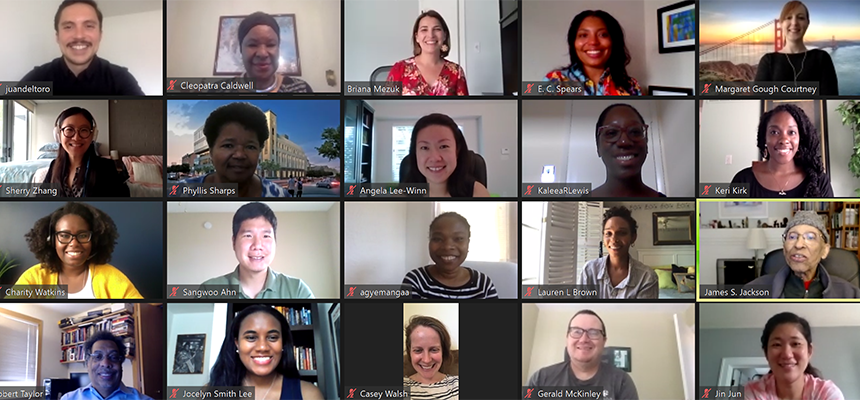Dr. Erica Spears one of 15 national scholars to new well-being and inequality research training program
Health inequality and systemic racism have long threatened the lives of African Americans. The COVID-19 pandemic and increased awareness of police violence in 2020 have intensified nationwide action toward solutions and change for traditionally underserved populations.
For health disparities researchers like HSC Assistant Professor Erica Spears, PhD, who has dedicated her career to working on critical public health concerns facing African American communities, there is immeasurable value in collaborating with others, especially across professional disciplines related to social determinants of health.
This year, Dr. Spears was one of 15 scholars chosen for the highly competitive, inaugural cohort of the Michigan Integrative Well-Being and Inequality (MIWI) Training Program, hosted by the University of Michigan Center for Social Epidemiology and Population Health. The program is funded by the National Institutes of Health (NIH), Office of Behavioral and Social Science Research, and the National Center for Complementary and Integrative Health.
The program provides early-career scientists with an opportunity to expand their research skills and extend their network of mentors and collaborators. Cohort members also receive support and assistance with research projects focused on the relationship between mental and physical health.
The cohort recently opened with an intensive, online summer institute and will continue in a structured format through next spring. An important goal of the program is for participants to develop professional partnerships that continue after the first year, as they move on to lend their own expertise to the next, incoming group of promising researchers.
“To connect with other health disparities investigators right now, at such a crucial time – as existing systems continue to threaten the holistic health of African American communities and other historically marginalized groups – is an incredible opportunity,” Dr. Spears said. “It’s a challenging time to work in public health, but I’ve never felt that my work was more necessary than it is right now.”
Dr. Spears focuses on the complex relationship between race-based stressors, holistic health and health behaviors.
“Scholars often find themselves working in isolation,” she said. “As an African American woman who identifies with and belongs to many of the communities I study, this opportunity to collaborate with other health disparities researchers is important to me. It represents an opportunity to extend the reach of my voice and expertise to a larger academic landscape and extend my efforts to improve health outcomes for racial minorities.”
COVID-19 has been more deadly for people of color, revealing stark racial disparities across the U.S. and adding increased burden to communities already long overstressed before the pandemic. African Americans are nearly twice as likely to die from COVID-19 compared to others in the U.S. population. Increasing racial tensions of the last several months and growing reports of African American deaths from police violence across the country have pushed rates of depression and anxiety to unprecedented levels within Black communities.
“It’s a tremendously stressful time. There is a lot of pain, fear, disappointment and other raw emotion right now. It’s very difficult for me, too,” Dr. Spears said. “For African Americans, it’s like we are going through two pandemics at once.”
The impact of a person’s mental health on their physical health shouldn’t be underestimated, she said, and the longer-term effects of what people are living through currently will be important down the road as well.
“The complexities contributing to some of the poor health outcomes observed in African American communities are getting more complicated every day,” Dr. Spears said. “How does witnessing a murder on social media or in the news, or experiencing other acts of violence against people you identify with, affect you in the long term?”
“These things are impacting health right now, even if we aren’t sure how. While the pathways may vary, we’ll never truly resolve health disparities without addressing the systemic issues tied to race and racism in this country.”
Health disparities research emerged about 40 years ago, yet African American and certain other marginalized populations have seen little change in health outcomes or quality of life.
“What’s not working? If we are doing things the right way, we should see improvement. But disparities have widened, conditions have worsened,” Dr. Spears said. “The solutions aren’t simple.”
“Health and societal inequalities, and the crisis intersection of COVID-19 and systemic racism, require work at every level of society and across disciplines, which connects to the premise of the MIWI program – health doesn’t happen in a vacuum.”
MIWI cohort participants come from diverse backgrounds and experiences, including researchers studying marginalized populations; physicians, nurses, pharmacists, dentists and allied health professionals; anthropologists, sociologists, social workers, psychologists, economists; and others who address the mental and physical impacts of health disparities.
“The work we do now to ensure that the needs of our most vulnerable communities are met will say a lot about the kind of country we want to be,” Dr. Spears said. “The relevance and consequences of this work take on a deeper meaning when it feels like the whole country is on fire and people are reaching out for healing and solutions.”
The MIWI cohort program and similar efforts around the country bring hope for improved health and societal outcomes among marginalized populations that most need attention, even more so now during the unprecedented challenges of current times.





Social media